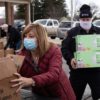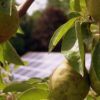March 18, 2021 | 5 Nissan 5781 Dear All, The whole world we live in, right now, is “both/and” rather than “either/or.” Everything happens simultaneously. Everything and its opposite is true. Things overlap and repeat, fold in upon themselves. I feel this strongly in relation to the economy, as well as so much else. It is good that the federal government has learned some of the (negative) lessons of 2008, and before that of Herbert Hoover. Paul Krugman has argued repeatedly that it’s wrong to fear inflation in a deflationary environment. If the government were not printing money – had not printed money this last year – then millions and perhaps tens of millions would be out of work, perhaps homeless, perhaps hungry. And it is always those who already have the least who suffer the most. So: printing money is good. And the American Rescue Plan is especially commendable because, for the first time since perhaps Lyndon Johnson, there’s a (somewhat) focused attempt to get the most help to those who are poorest. This is what the Torah enjoins. And yet one other consequence of this is that all sorts of bubbles are developing. From GameStop to the […]
Topic: Jewish Texts
Blessing for a Wounded Earth
by Rabbi Dianne Cohler-Esses O Holy Earth! We live on your sacred ground. We were placed here to guard you and tend you to bless, respect and protect your overflowing goodness sustaining maintaining life. But we– we misunderstood. Our growth, our strife went unchecked. We pollute you instead of salute you. We reject your diversity dissect your totality disconnect from your sanctity and our own morality until nothing is left and we stand here bereft. Deforestation. Degradation. Discrimination. Manipulation. Over-administration of what is pure and simple and wild. We’re killing what is wild in you and in us. We impoverish your soil, despoil your oceans. We are left with rivers of tears and fears, the searing truth that we just can’t go on living this way. It’s time to pay. O Great Mother! We treat you like a stranger, an other, when truth is — we are you and you are us. In our lust we avert our eyes from you from our own reflection in your holy waters. We’ve stripped your royal seal. We can’t see beyond our greed our endless need. We refused to kneel. It’s time to offer a prayer for your welfare- to reduce our speed- […]
Thoughts on this Tu B’Shvat
Thursday, January 28, 2021 | Tu B’Shvat 5781 Dear All, One of the questions underpinning the entire Jewish environmental movement is the question: to what end? If we want to make a difference in the world, can’t we – shouldn’t we – just support 350.org, or the Sierra Club? And my answer is that we should – and Hazon, over the years, has partnered with both organizations, and many others outside of the Jewish community. But we’re half way through an 8-part series, learning with Rabbi Yedidya Sinclair about masechet ta’anit, and reading ta’anit closely to develop from it a sense of what a contemporary Jewish climate theology might look like. And in this week’s class, I really did have a deep moment of clarity, which I want to share with you, on Tu B’Shvat. Tu B’Shvat, of course, is “the new year for trees.” This year we’re one of the anchor partners for the Big Bold Jewish Climate Fest, and we hope you’ll join us for one or more of the 160+ sessions that are happening from now through Sunday. One can talk – and we have, and we will – about the history of Tu B’Shvat, how […]

Hazon Detroit: Tragic Hope & Meaningful Action
by Rebecca Levy Dear Friends, Since the summer, we have had the incredible fortune of having six wonderful interns supporting and enriching our work. Much gratitude to Repair the World Serve the Moment, the Applebaum Internship Program, JOIN, and the Hornstein Program For Jewish Professional Leadership at Brandeis University. One of these interns, Rebecca Levy, has written the piece below and we are thrilled to be able to share her words with you. In loving community, Wren, Rabbi Nate, Marla, and Hannah When sitting in shul, my favorite part of most sermons is the speaker’s call to action, which typically comes towards the end. Yes, it is important to learn and the lessons that we draw from the Torah and from life are beneficial, but as one of my English-teachers always said, “so what – who cares?” – English-teacher code for “why is this important and what can we take away from it?” Especially in days like these, when the feeling of loss and uncertainty can be overwhelming, I like to know what I can do moving forward. Do not get me wrong, I love to learn and learning is necessary if you want to act meaningfully, but […]

Hazon Detroit: I Am To My Beloved
Dear Friends, When this pandemic began it was winter. You may remember it snowing while we were Safer At Home. Winter eventually gave way to spring, as it does, and life bloomed bright while we remained in quarantine. As the months rolled by, the heat quickly picked up and summer kicked into high gear. And now, with Coronavirus still present as ever, fall is here. Our days are getting shorter while the golden hued sunlight mimics the bashful change of leaves. On the Jewish calendar, these subtle changes in light and leaf mean that the High Holidays are just around the corner. Today we find ourselves squarely in the Jewish month of Elul, a month of introspection and penitence that leads up to Rosh HaShanah. We know that this period is one of intensity and spiritual work. We’re reminded of that each day of Elul, when the shofar (ram’s horn) is blown. We know it’s a time of teshuvah (return) and selichot (repentance), illustrated by the cheshbon ha’nefesh (soul accounting) that we’re instructed to do all month. And many of us attend religious services (virtually, of course, this year) more in the weeks ahead than we do the rest of […]

Rosh Chodesh Elul, the instinct for joy – and a great short video on blowing the shofar
Thursday, August 20, 2020 | 30 Av 5780 | Rosh Chodesh Elul Dear All, Today is my grandma’s 17th yahrtzeit. Tomorrow, the first of Elul, would have been my father’s 88th birthday. To be honest, we didn’t realize that this was Dad’s birthday until after he died. But in my grandma’s case, her yahrtzeit has always been significant to me. This is because of the fascinating construction of Rosh Chodesh Elul. It’s a two-day new moon – today and tomorrow – but today is the last day of Av, and tomorrow, which is the second day of Rosh Chodesh, is the first day of Elul. And so tomorrow is the day we start to blow shofar. To me, my grandma’s yahrtzeit comes to remind me, as it were – tomorrow it begins… And by “it” I mean this whole period, from now through to the end of Simchat Torah, with Rosh Hashanah and Yom Kippur as the twin apex points, in the middle. “It” is a shorthand for “teshuvah, u’tefillah u’tzedakah” – teshuvah, striving to return to our best selves; tefillah, something about looking both within and beyond, for guidance and with gratitude; and tzedakah, not just in the broader sense […]

Reb Isaiah at the March, and Rob Kutner on Daf Yomi…
Thursday, January 9, 2020 | 12th Tevet 5780 Dear All, First: we were so proud of Hazon’s rabbi-in-residence, Isaiah Rothstein, who had a lead role at the march against anti-semitism in NYC on Sunday. You can see links to that here and here. Secondly: part of the punchline of the Bari Weiss book on anti-semitism – with which I very strongly agreed indeed – is that it’s vital that we not somehow become “anti-anti-semites.” That’s not why I’m Jewish. I’m Jewish because I love the tradition and I think it wise; and – right now – I especially believe that we should be rallying the full resources of Jewish tradition and of the Jewish community to address the global climate crisis, which is the greatest crisis civilization has yet faced. And so one aspect of that is actually to deepen our own Jewish learning. That leads me to daf yomi… Daf Yomi – literally “a page a day” is a recentish (early twentieth century) tradition of learning the entire Talmud, by doing a page a day; and if you do that, and stick to it, you’ll learn the entire Talmud in about 7 1/2 years. I somehow assumed that this was only an ultra-orthodox practice. But way […]

Gratitude… and getting ready…
Friday, August 23, 2019 | 22 Av 5779Dear All,It’s summertime. This email is full of gratitude and the inspiration to strive to do good in the world.Years ago I learned from Anna Hanau this line from one of her teachers – you know you’re on the right track when your solution to one problem solves a bunch of other ones.That’s true of our work in Michigan, epitomized by the Hazon Michigan Jewish Food Festival – and last weekend we held our fourth, the largest and most successful yet, with over 7,000 people. We’re helping to drive change. We’re helping Jewish organizations to become more sustainable, including the now 20 who are in our Hazon Seal of Sustainability program from the Detroit region. We’re strengthening local food systems. We’re playing a not insignificant role in helping to reconnect the suburbs and the city, and the Jewish community and the African American community, and we’re especially proud of the work we’ve done in supporting Oakland Avenue Urban Farm. And we’re doing all this with love and celebration and Jewish groundedness and openness. So: real gratitude. Huge thanks to our staff and funders, to all our partner organizations, to our volunteers and helpers, to all the purveyors and […]

Eikev and the Seven Species | D’varim HaMakom: The JOFEE Fellows Blog
by Sarah Rockford, JOFEE Fellow Cohort 4, Maine Jewish Food Network at Colby College Center for Small Town Jewish Life – Waterville, ME Parshat Eikev Fourteen years ago I read from parshat Eikev as a bat mitzvah. As I stood on the bimah and chanted my way through the aliyot, I reflected briefly that the eleventh-hour cramming I’d done over the past hours seemed to be paying off, but reading the final aliyah my concentration waivered, and I lost my place in the scroll. I continued to chant the Hebrew words I’d memorized while theatrically moving the lost yad along the rows of letters on the parchment. When I ran out of words in my head I stopped chanting and shot a desperate look at the rabbi—hoping he would reorient me so I could finish the portion. Our eyes met, he smiled, and congratulated me. I’d finished the aliyah from memory without realizing, and no one was the wiser for my mistake. Relieved and full of adrenaline I started to cry as the congregation began to sing Siman Tov U’Mazal Tov. I believe everyone thought I was having a profound spiritual moment, but these were tears of relief. I was just happy the […]

Endings and beginnings
Significant staff changes at Hazon… Thursday, August 8, 2019 | 6 Av 5779 Dear All, In the Torah, this is an end, and then a beginning. We’re starting to read the book of Devarim. It’s the last book of the Torah, and a pivot which leads in one direction to the post-Torah books, Nevi’im and Ketuvim (the Prophets and the Writings) and, in a different direction, back again to the Genesis stories. In the Jewish calendar, this is the end of the three weeks. On Saturday night Tisha b’avbegins, and we re-enact our own deaths; on Sunday afternoon we start to come back to life, and in due course it will be Tu b’av, the festival of love, and then Elul and the beginning of a whole new year. And at Hazon much change also. Our strategic plan marks the end of one era, and the start of the next. It represents the belated completion of the three-way merger between Hazon, Isabella Freedman, and Teva. Legally that merger took place on the 1st of January 2014. But it is only now, in a sense, that we are finally committing to weave together the different parts of this organization towards a single clear goal – changing the nature of organized Jewish life, […]
Harvesting and Baking our Heritage | D’varim HaMakom: The JOFEE Fellows Blog
by Hannah Fine – Hazon Detroit Parshat Shelach In parshat Shelach, Moses sent twelve spies to scout out the land of Canaan and report back to the Israelites. All of the spies returned with the same objective report. It was a land of milk and honey brimming with fruit and sustenance. There were grapes, and figs, and pomegranates which they even brought back to show Moses and the Israelites. The spies also reported that the inhabitants of the land were mighty and intimidating. While all twelve spies saw the same land and shared the same observations, they were split between two opposing conclusions. Ten of the spies were convinced that the formidability of the inhabitants meant certain demise for the Israelites. Doom was a foregone conclusion so it was not even worth trying. The other two spies, Caleb and Joshua, had a different interpretation. They were confident that, despite the strength of the peoples and societies in Canaan, the Israelites could overcome it. Caleb and Joshua contended that the greatness of the Promised Land was worth the challenge. At Hazon Detroit, we are working to overcome a formidable structure that exists in our land: the lopsided nature Michigan’s grain industry. […]
Blessing Family & The Earth | D’varim HaMakom: The JOFEE Fellows Blog
by Jared Kaminsky, Shoresh Parshat Vayechi In only 3 short months, I’ll be turning 30 years old! I was recently married, and purchased a home, and feel that I have made a massive leap into adulthood. I will one day, G-d willing, start a family and have children of my own. It will be my responsibility to pass on teachings to my children (and grandchildren) that reflect my values. This is a HUGE responsibility! They will see me as a guide and role model for how to act in the world. What will I share with them? What type of father, grandfather, neighbour, and citizen will I be in their eyes? In this week’s parsha, Vayechi, Jacob is nearing the end of his life and he decides to pass on his final wishes and blessings to his own family. He asks his son Joseph to bury him in Israel. He also blesses Joseph’s sons Ephraim and Manasseh elevating them to be considered his own sons and heads of tribes one day within Israel. In addition, Jacob provides individual blessings to the rest of his sons, each of whom will be leaders among their tribes. My grandfather is one of the […]
Light In The Dark | D’varim HaMakom: The JOFEE Fellows Blog
by Ilana Unger, Pearlstone Center Parshat Vayeishev In parshat Vayeishev (Genesis 37:1-40:23), lands on the third Shabbat of Kislev, we connect deeply to this Jewish month of actualization and revelation. For example: Vayeishev is the Hebrew word for “and he lived” (actualization) and nine out of the ten dreams that we read in the Torah are in this month (revelation). To recap the many things that happen in this parsha: Joseph is exiled and sold into slavery in Egypt by his brothers. Joseph is then falsely accused of sexually assaulting Potiphar’s wife and is sent to the Pharaoh’s prison where he becomes an overseer in the prison. He is joined in prison by the Pharaoh’s butler and baker. They say they have had vivid dreams and are looking for an interpreter. Joseph interprets their dreams and accurately does so, predicting that the baker be hanged while the butler will be restored to his job duties. As Joseph is literally in a dark place in the prison, he is selfless and wants to hear and listen to how he can help the butler and baker. Kislev, which derives from the Hebrew word kesel (כֶּסֶל), means either “security,” or “trust.” Joseph seems to […]
Listen Ya’ll! | D’varim HaMakom: The JOFEE Fellows Blog
by Alex Voynow, Jewish Farm School Parshat Haazinu [NOTE: Applications for the next JOFEE Fellowship cohort are open now through October 5! Apply today!] In Ha’azinu, Moses sees the Israelites for who they are: humans, scarred by 40 years of impatient wandering and in no mood to listen obediently. Moses is 120 years old and holds so much wisdom; this is the last day before his death, and he has some things to say. He has the story of his life to tell, which in his epic personal union with the Israelite people is also the story of God. He needs them to understand, like the tender, concerned patriarch that he is, how to live in God’s favor so they can blossom into the promised land and not mess up this covenant (fast-forward: oops). What he has to say is so important that he does something that really resonates with me. Moses speaks language that heaven and earth themselves will understand, and in a language that will more likely move the people: in song. He launches into a 48-verse poem doing his damnedest to sum up his life’s spiritual learnings. I’m not going to get into it because it’s densely […]
Indigenous Rights and Reconciliation | D’varim HaMakom: The JOFEE Fellows Blog
by Jared Kaminsky, Shoresh Parshat Shoftim The parsha of the week is Shoftim, which means Judges. As Moses nears the end of his life, he wants to ensure there is a system of governance in society. Shoftim gives detailed ordinances on many topics of law, including appointing judges, laws that kings should follow, creating cities of refuge when crimes are committed, and the rules of war. For example, the parsha states that appointed judges are forbidden from taking bribes and there must be two credible witnesses for a conviction. Another ordinance demands that kings must not have too many horses and must always carry around two Torah scrolls to remind them that G-D is above them. The Torah even provides a city of refuge for those who accidentally murdered someone to live in safety! While many of these laws do not apply to modern society, there are some important insights into preventing corruption and treatment of humankind that we can still learn from. Moses recognized that every generation has the obligation to critically examine and apply the laws of the Torah. As Jews we should examine the laws that govern the places we live and work to protect the rights of […]



